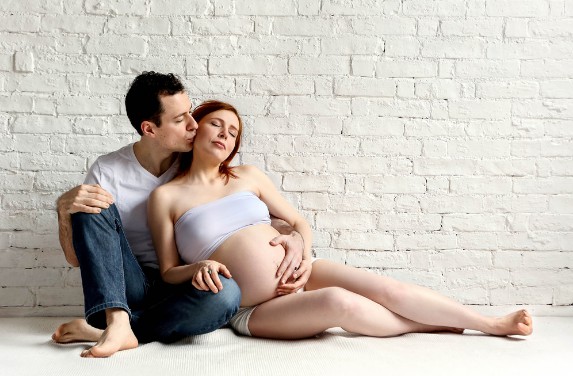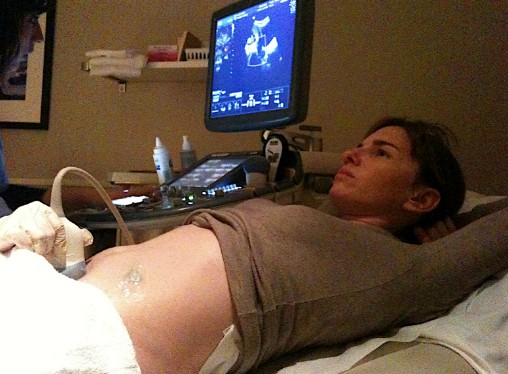Back pain is an issue that pregnant women face so frequently that the two terms can be considered practically synonymous. More than 70 percent of women report some form of back pain during the course of their pregnancy. The second and third trimesters are especially rough for backaches and similar issues.
This doesn’t mean that the early days of your pregnancy are going to be smooth sailing, sadly. Persistent back pain can set in as early as the 18th week of pregnancy, and it typically grows more severe as you get closer to giving birth. You even get to look forward to the possibility of postpartum back pain after your child is born.
The good news is that you’re a long way from helpless when it comes to dealing with the discomfort brought on by pregnancy. There are even women out there who experienced significant back pain before getting pregnant but then had a lessening of symptoms during their terms.
What Causes Back Pain in Pregnancy?
Back pain shows up frequently during pregnancy because of many different factors. While the condition itself regularly brings on lower back pain, the frequency and severity of pain are often heightened for women with pre-existing histories of back pain and those who are overweight.
All of the following factors can contribute to back pain when you are pregnant:
– Weight Gain: The added mass of both your baby and your own body changing to support it may add stress to your spinal column.
– Center of Gravity: Pregnancy causes your center of gravity to shift forward as your uterus expands and the baby grows. This leads to alterations of your posture.
– Stress: The muscles of the back experience added tension during periods of emotional strain, and that tension often comes out in the form of back spasms or back pain. Backaches may become especially severe when your pregnancy subjects you to especially high levels of stress.
– Posture: Spending too much time on your feet, sitting with poor posture, or bending over incorrectly can all trigger back pain episodes. As your body changes, it becomes more challenging to maintain a healthy posture.
– Hormonal Changes: The body produces a specialized hormone called relaxin during pregnancy. The purpose of this change is to loosen the joints and ligaments of the pelvis to make the birthing process easier. This hormonal change affects the entire body, though, and relaxin may make the ligaments in your spine looser.
– Muscle Separation: There are two parallel sheets of muscle connecting the pubic bone to the rib cage, the rectal abdominis muscles. As the uterus expands, it may force these muscles apart down the centerline. This separation may, in turn, make back pain more severe.
What are the Symptoms of Pregnancy Back Pain?
The back pain brought on by pregnancy usually makes itself felt at the juncture between your pelvis and your lower back. This is easy to mix up with pelvic pain, so it makes sense to separate these pains into two groups:
– Lower Back Pain: This is a dull, persistent pain which is particularly notable when you bend forward. This pain makes it harder to move the lumbar (lower) portion of your spine. With lower back pain, certain muscles in the area become sensitive to touch.
– Pelvic Girdle Pain, or PGP: This pain is caused by loosened joints and ligaments in your pelvis. It may center on the joint between your lower spine and your hip bones, the sacroiliac joint. PGP can take many forms, including stabbing, shooting, burning, and dull pain. PGP often comes and goes, and it sometimes radiates into the backs of your thighs.
How Can You Treat Back Pain during Pregnancy? (Remedies for Pregnancy Back Pain)
Many women experience back pain during pregnancy. Thankfully, there are plenty of things you can do to get relief from this pain. The methods outlined below will help you to prevent back pain in the future, and will also provide you relief in the present.
1. Get Exercises
If you’re in your third trimester, the idea of exercise may sound like torture for you. However, some light exercising can help to ease pain and stiffness. You don’t need to put in a heavy-duty workout; just walking around the house or doing some basic stretches can really help. Swimming is also a great way for pregnant women to relax; just avoid the breaststroke. You may want to try taking a tai chi or yoga class. There are actually yoga classes that are designed with pregnant women in mind. Just make sure you don’t push yourself too hard. You don’t need to force yourself to workout. Listen to the signals your body is sending you.
When you’re working out, you should focus on stretching your lower back. Start by resting your hands on your needs. Hold your head up straight as you pull your stomach inwards. Round your back as you bring in your stomach. Hold this position for a few seconds before relaxing. Try to keep your back as flat as you can. Work your way up to 10 repetitions of this exercise. You should ask your doctor about any other stretches that they recommend.
2. Get A Prenatal Massage
Massages are one of the best way to relieve severe back pain. Someone that is certified to provide a prenatal massage will be able to relax any muscles that are clenched. Sciatic nerve pain is common in pregnancy, and massage is one of the best ways to alleviate that pain. Studies have also found that massage can lesson the symptoms of depression and anxiety. That said, it’s a smart idea to check with your doctor before going in for a massage. You should also make sure that the massage therapist you see is certified.
3. See A Chiropractor
While a lot of people see chiropractors when they want to have their joints cracked, a chiropractor can actually do a lot to alleviate back pain. From soft tissue work to joint manipulation, a skilled chiropractor can provide pregnant women with the relief that they need. They may also be able to prescribe exercises.
4. Try Acupuncture
Acupuncture is a form of Traditional Chinese Medicine that involves stimulating the body with needles. Studies have suggested that acupuncture can relieve both lower back pain and the pelvic pain that is commonly experienced during pregnancy. If you have a fear of needles, acupuncture may not be a good fit for you. If you don’t have a needle phobia, however, you may want to check with your doctor to see if they recommend acupuncture.
5. Meditate
If you don’t have the energy for exercise and can’t afford a massage, you still have options. Meditation costs nothing, and you can do it anywhere. Research has found that meditating triggers a relaxation response in the body. This helps the brain to control to production of stress hormones. Stress can take a toll on the body. It can raise your blood pressure and can cause your muscles to become more tense. If you’re able to control your body’s response to stress through meditation, you’ll be able to reduce these symptoms. Meditation can also help you to increase your overall pain tolerance. Not only will this help you to manage your back pain; it will help you when it comes time to deliver your baby.
6. Get Proper Support During Sleep
It can be hard to get a good night’s sleep when you’re pregnant. Unfortunately, poor sleeping habits can increase back pain. Make sure you’re sleeping on your side rather than your back. You should also bend one or both of your knees. You might want to use support pillows between your knees or abdomen. Placing a pillow beneath your back can help as well. If you’re still having issues, you may want to invest in a mattress topper or a firmer mattress.
7. Try Wearing A Maternity Belt
When you’re pregnant, your expanding belly can place a great deal of strain on your lower back. This can cause a lot of issues, especially for women with weak abdominal core muscles. Thankfully, a maternity belt can provide the support you need. The belt can support your stomach and prevent damage to your lower spine. You can pick up one of these belts at any major maternity clothing store. You can also find them online. If you do wind up using one of these belts, you should explore other back pain remedies as well. Remember, there are many ways to treat back pain during pregnancy.
8. Make Sure You’re Wearing Supportive Footwear
High heels may look great, but they are bad for your feet and back, especially during pregnancy. When you wear heels, you’re placing more pressure on your back, which can damage your hip joints and spine. Wearing heels can also make it difficult for you to keep your balance. You don’t have to stop wearing fashionable clothing; you just need to make sure that the shoes you do wear are safe and supportive.
9. Aromatherapy
People have long used essential oils to relax ad relieve pain. Lavender oil can definitely help you to relax your muscles. If you are going to be using these oils, you may want to try placing a few drops in a warm bath. If you’re not in the mood for a bath, you could try creating a warm compress that is scented with an essential oil. If you place the compress on the small of your back, you’ll feel better right away.
10. Use The Heat And The Cold For Pain Relief
Exposure to the heat and the cold can provide short-term pain relief. As mentioned above, taking a nice warm bath can be very soothing. A heating pad is also a good way to relieve pain in a specific area. If the weather is hot, you may find that a cold pack provides more relief. Both hot and cold packs are very easy to apply. If you are using the heat or the cold to get pain relief, you should cover the pad with a thin cloth. This can protect your skin from damage. Avoid applying any sort of heat to the abdomen when you are pregnant.
11. Improve Your Posture
Posture issues can lead to back pain, especially when you’re sitting for long periods of time. When you’re sitting in a chair, you need to make sure that you are sitting up straight. You should make sure you have the proper support; you may want to use a cushion when sitting at your work chair. If you are suffering from lumbar pain, you might want to try using a footstool. Get up and walk around from time to time. It’s important not to sit for too long. You should also be careful when you are lifting, even if the object you are lifting is fairly small. You should never lift with your back or bend your waist. Instead, you should squat and use your legs to lift. Be aware of your limits. If you need help, you should request it. It’s also a good idea to be cautious as you get out of bed, especially during the end of your pregnancy. Bend your legs and dangle them over the side of the bed. Use your arms to push your body upwards as you stand.
When Do You Need Medical Help?
Ordinary back pain is usually not a serious enough problem to get in touch with your doctor. If you experience severe pain for more than two weeks, though, it’s time to check in. Doctors will typically start with basic pain medication (e.g. acetaminophen) before moving on to other treatment options. Additionally, if you experience any of the following more severe symptoms, contact your doctor immediately:
- Rhythmic cramping pains
- Back pain accompanied by a fever, burning sensation when you urinate, or vaginal bleeding
- Severe back pain associated with trauma
- You lose feeling in one or both legs
- You experience sudden episodes of weakness or a lack of coordination
- You lose feeling in your buttocks, groin, or genitals. This could lead to either incontinence or constipation.
Severe back pain may actually be a symptom of rarer and more serious conditions, such as vertebral osteoarthritis, pregnancy-associated osteoporosis, or septic arthritis. Rhythmic back pain might signal the onset of preterm labor. Consult with your doctor if you are experiencing any of the complications described above.
How Can You Prevent or Minimize Back Pain During Pregnancy?
It might not be possible to spare yourself entirely from back pain during pregnancy. You can certainly take steps to mitigate the severity and frequency of the pain! All of the following steps may be helpful:
- Stand up as straight as possible without tilting your chin upward.
- Vary your standing and sitting positions throughout the day.
- Speak with your doctor about an exercise regimen designed to support and strengthen the back and abdomen.
- Squat to reach low-lying objects rather than bending down.
- Wear shoes with good support and stay away from high heels.
- Try not to sleep on your back.
- Wear a support belt for your lower abdomen.
- Consider chiropractic adjustment by a professional caregiver.
- Get plenty of rest.
- Elevate your feet when possible.
- Use additional lumbar support while sitting or driving.
- Make sure your seated workspace (chair, desk, computer, etc.) is ergonomically healthy.
- Avoid carrying excessive weight (shopping, etc.) wherever possible.
- Wear a properly-fitted maternity bra that does not subject your shoulders or ribcage to undue strain.
- Use extra pillows to support yourself in bed. Keep your thighs parallel.
- Get out of bed by rolling onto your side, sitting up with your legs off the bed, and then standing.
- Invest in a firmer mattress to deliver added support while you’re pregnant.
Related Posts
- Best Pregnancy Support Belts (Maternity Belts & Belly Bands) For Back Pain Relief – Reviews (Top Picks) & Buyer’s Guide
- Best Body Pillows for Back Pain Relief with Buyer’s Guide 2017:Top Rated Maternity Pillows for Back & Hip Pain During Pregnancy
- Top 5 Best Heating Pads for Back Pain Relief with Buyer’s Guide
- Best Mattress Toppers for Back Pain Relief with Buyer’s Guide
- Best Smart Wearable Posture Correctors ( Posture Trainers ) with APPs for Back Pain Relief






